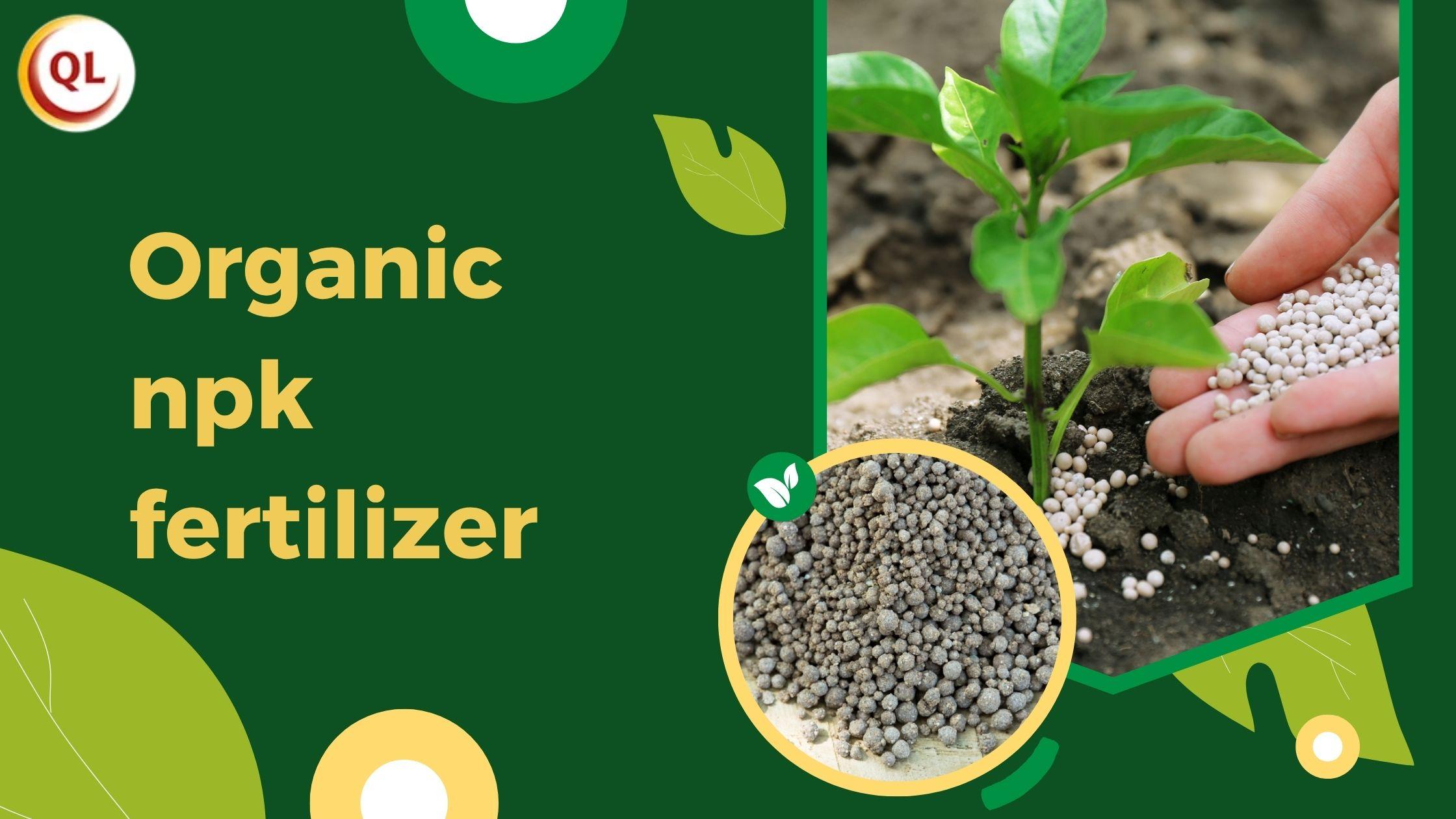A Farmer’s Guide to Choosing the Right Organic NPK Fertilizer

In today’s world of conscious farming, choosing the right organic NPK fertilizer can significantly impact crop yield, soil health, and environmental sustainability. Whether you're a seasoned grower or transitioning from synthetic inputs, selecting the right formulation of nutrients—naturally sourced—is essential.
At Qlfarms, we specialize in providing high-quality organic fertilizers tailored to meet the nutritional needs of various crops and soil types. This guide is designed to help you understand what organic NPK fertilizer is, how to choose the right one, and why going organic is a wise investment in your farm’s future.
What Is Organic NPK Fertilizer?
NPK stands for Nitrogen (N), Phosphorus (P), and Potassium (K)—the three essential macronutrients plants need to grow:
-
Nitrogen (N) supports leafy growth and chlorophyll production.
-
Phosphorus (P) boosts root development, flowering, and fruiting.
-
Potassium (K) enhances overall plant health, water regulation, and disease resistance.
An organic NPK fertilizer delivers these nutrients from natural sources—such as compost, chicken manure, seaweed, or bone meal—rather than synthetic chemicals. Unlike conventional fertilizers, organic NPK options improve soil structure, microbial activity, and long-term fertility.
Why Choose Organic Over Chemical Fertilizers?
Chemical NPK fertilizers might show quick results, but they come with long-term risks: soil degradation, water pollution, and reduced microbial diversity. In contrast, organic NPK fertilizers:
-
Build healthy, living soil
-
Release nutrients slowly and steadily
-
Pose no risk of chemical residue in crops
-
Improve long-term sustainability and productivity
At Qlfarms, we’ve seen firsthand how our organic NPK products help farmers reduce input costs over time and improve soil vitality.
Understanding Your Soil and Crop Needs
Before you select any fertilizer, the first step is soil testing. This provides a clear picture of your soil’s nutrient levels, pH, and organic matter content.
Ask yourself:
-
What crops am I growing?
-
What are the nutrient demands during each growth stage?
-
Is my soil sandy, clay-based, or loamy?
-
Is the pH acidic, neutral, or alkaline?
For example:
-
Leafy greens like spinach or lettuce may need higher nitrogen content.
-
Root crops like carrots benefit from more phosphorus.
-
Fruit-bearing plants such as tomatoes or peppers require extra potassium during flowering and fruit development.
Our team at Qlfarms can assist with soil testing and interpreting the results to match you with the right fertilizer blend.
Decoding the NPK Ratio
Every organic NPK fertilizer comes with a ratio on the packaging, such as 5-3-2 or 4-4-4. These numbers represent the percentage of nitrogen, phosphorus, and potassium, respectively.
-
5-3-2 means the product contains 5% nitrogen, 3% phosphorus, and 2% potassium.
-
Balanced formulas like 4-4-4 work well for general use or mixed crops.
At Qlfarms, we offer a range of custom-blended NPK ratios for specific crops and growth phases—ensuring that your plants get the right nutrients at the right time.
Choose the Right Organic Sources
Organic NPK fertilizers can be made from a variety of natural ingredients. Here are some commonly used materials:
|
Nutrient |
Organic Source |
Benefit |
|
Nitrogen |
Chicken manure, compost, soybean meal |
Promotes lush green growth |
|
Phosphorus |
Bone meal, rock phosphate |
Encourages root and flower development |
|
Potassium |
Wood ash, kelp meal |
Improves drought resistance and fruit quality |
At Qlfarms, one of our flagship products is Chicken Manure Organic NPK Fertilizer, which not only provides a rich source of nitrogen but also improves microbial activity and water retention in the soil.
Granular vs. Liquid Organic NPK Fertilizer
Both forms are effective, but the choice depends on your farming setup:
-
Granular fertilizers are slow-releasing and ideal for broadcast application or soil incorporation.
-
Liquid organic NPK fertilizers are fast-acting and better for foliar feeding or drip irrigation systems.
Our specialists at Qlfarms can help you choose the ideal form based on your application method and crop schedule.
Tips for Application and Maximum Efficiency
-
Time It Right: Apply before planting or during active growth phases.
-
Avoid Over-Application: More isn’t always better. Over-fertilizing can cause nutrient lock-out or leaching.
-
Mix Well Into Soil: Incorporate granules into the topsoil to prevent runoff.
-
Rotate Crops: Nutrient requirements vary by crop, and rotation helps maintain soil balance.
-
Supplement with Microbes: Combine your organic NPK with compost tea or beneficial fungi to further boost nutrient availability.
Why Choose Qlfarms Organic NPK Fertilizer?
We understand that your farm is more than just land—it’s a legacy. That’s why Qlfarms is committed to:
-
100% Organic Certification
-
Eco-friendly packaging
-
Custom NPK blends for different crops
-
On-site technical support and consultation
-
Export-quality fertilizers made in Vietnam
We’re proud to be one of the trusted organic fertilizer suppliers in Vietnam, serving farmers locally and globally with sustainable solutions that actually work.
Conclusion
Choosing the right organic NPK fertilizer isn’t just about nutrients—it’s about supporting the entire ecosystem of your farm. With the right knowledge, testing, and trusted supplier, your crops will thrive naturally and sustainably.
Ready to make the switch to smart, sustainable farming?
👉 Contact Qlfarms today for expert advice and premium organic NPK fertilizers tailored to your farm.







